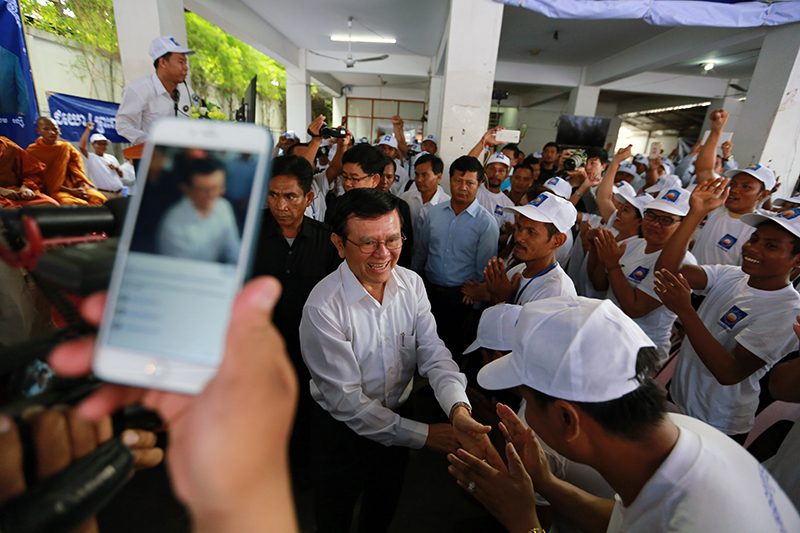Just a week ago, the opposition was threatening imminent mass demonstrations as Prime Minister Hun Sen was pledging to “eliminate” opponents who launched public protests. The tone has quickly—if only temporarily—changed.
In a message posted to his Facebook page on Sunday, CNRP Vice President Kem Sokha urged supporters to avoid “violent, rude or attacking words” that might inflame political tensions during the approaching Pchum Ben holiday.

The plea followed a speech by Mr. Hun Sen on Thursday that noted a fragile “cease-fire” between the ruling and opposition parties after the CNRP hinted at a possible end to its National Assembly boycott.
The apparent political pause, however, comes in the midst of a deepening government crackdown in which more than 20 rights workers and opposition politicians have been jailed over the past year.
On Sunday, Mr. Sokha said he was using the ancestral holiday to “pray for Khmer political families to meet together to solve the national issues.”
“I wish to ask again, especially to all levels of CNRP leaders and
NRP activists, to avoid using violent, rude, or attacking words that affect the atmosphere of the traditional ceremony and the long-term political atmosphere,” he wrote.
Mr. Sokha, who has been holed up in CNRP headquarters in Phnom Penh since May, was convicted on September 9 for refusing to appear in court to answer questions regarding a “prostitution” case involving an alleged mistress.
The government has staged several military exercises around the building, but has said it will not arrest Mr. Sokha until the appeals process is complete. If the verdict holds, the government said he would be sent to prison for five months and stripped of his role as a lawmaker.
The CNRP has threatened mass protests if the government follows through.
However, last week, CNRP lawmaker Son Chhay struck a conciliatory tone, saying that the party was willing to end its boycott of parliament if the CPP agreed to reconsider recently passed laws on the judiciary and summon four government ministers for questioning.
Soy Sopheap, a prominent media personality and occasional political fixer for Mr. Hun Sen, claimed on Monday that he was again helping the two sides resolve their differences. He urged reporters to wait and see if common ground could be found. “Please wait until the end and don’t spoil the work,” he said.
CNRP spokesman Yim Sovann said on Monday that he had no information on any efforts by Mr. Sokha to engage the CPP in talks, adding: “Let him do his job.”
CPP spokesman Sok Eysan reiterated the government’s claims that the charges against Mr. Sokha had nothing to do with politics.
“He calls for the people to stop fighting between each other and said Khmer politicians should work together to negotiate solutions to national issues. But it is not a national issue,” he said. “Any negotiations cannot include the subject of releasing prisoners and people who disobey the law.”
Recent history, however, is marked with examples of Mr. Hun Sen seemingly using the courts to subdue competitors with charges that he denies are political, then going on to pair pardons with short-lived political reconciliations.
Last year, for example, 10 land-rights activists were granted royal pardons from charges widely seen as politically motivated just two days after Mr. Hun Sen and CNRP President Sam Rainsy approved the nine members of the new National Election Committee. The political deal that ended the opposition’s 10-month boycott of parliament in July 2014 saw the release of several imprisoned lawmakers who had been jailed just days before.
Should Mr. Hun Sen broker a compromise, he would be following a well-established template first used after the 2003 national election, when Mr. Rainsy and Prince Norodom Ranariddh, the president of Funcinpec, formed the “Alliance of Democrats.”
Then, as in the months after the 2013 election, the opposition leaders refused to participate in the National Assembly amid allegations of electoral fraud; Mr. Hun Sen offered a deal that satisfied one opposition leader and angered the other; and a short-lived period of political goodwill was interrupted by a crackdown that sent Mr. Rainsy to France.
Mr. Rainsy’s last two stretches in exile ended in 2006 and 2013, both times after he received a royal pardon at the request of Mr. Hun Sen—many say to give the upcoming elections legitimacy. But during a speech in April, the prime minister said that the third time was not the charm.
“We have a culture of pardoning and a culture of peace, but we cannot pardon anyone who has attempted to make Cambodia fall into instability,” he said.
Ou Virak, head of the Future Forum think tank, said that Mr. Hun Sen’s more recent announcement of a cease-fire suggested he was “more open to compromise,” but that he was unsure about the prospect for broad concessions.
“Anything is possible in Cambodia, but also anything is possible with Hun Sen,” he said. “Let’s see what’s going to happen. But I think if the CNRP ends its boycott, they would release a few people.”
The most probable contenders for such a release would be four staff members of the rights organization Adhoc that were charged with bribery in conjunction with Mr. Sokha’s case, Mr. Virak said.
Political analyst Meas Ny said the parties appeared to be moving in the right direction.
“We’re seeing both sides using some positive language when before they were often attacking each other,” he said. “Both sides are in the deadlock because we see one side is strong and one other side is weak, one has the power and one has its leaders convicted.
“The CNRP doesn’t have anything left besides their blood to spill in mass protests, and the CPP doesn’t have anything besides organizing their guns to shoot people,” he added. “They both should reconsider dialogue.”